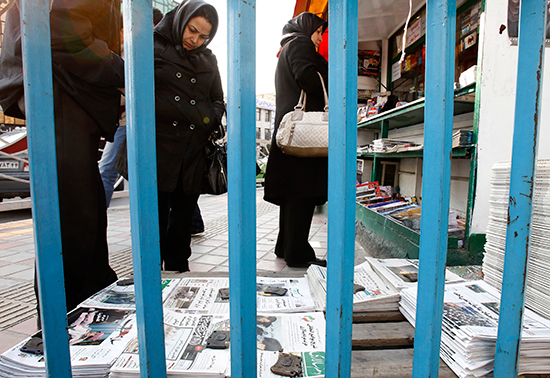New York, September 22, 2016 – Iranian authorities should immediately release two reformist journalists arrested in recent days and stop jailing the media for doing their work, the Committee to Protect Journalists said today. At the time of his arrest, pro-government media described Sadra Mohaqeq, the editor of the reformist newspaper Shargh Daily, as an “infiltrator.” Security forces detained online journalist Yashar Soltani after he reported on alleged corruption in Tehran’s municipal government, according to press reports.
Iranian intelligence forces arrested reformist journalist Mohaqeq from his home in Tehran, on September 19, according to the semi-official Mehr News Agency, which described Mohaqeq as “a collaborator who worked for anti-revolutionary media outlets” outside Iran, and who “reported to anti-revolutionary media outlets about internal affairs.” The news agency published a graphic alongside the report of his arrest prominently displaying the word “infiltration.” It was not immediately clear if these accusations referred to formal criminal charges. Iranian state media have leveled similar accusations at arrested journalists in the past, according to CPJ research.
In a separate case, Tehran’s Second Press Court on September 17 jailed Yashar Soltani, the editor of the architecture and urban-development news website Memari News, pending trial after the journalist was unable to post bail of 2 billion rials (roughly $63,700), according to press reports, which did not specify the charges.
Mohammad Bagher Ghalibaf, Tehran’s mayor, and Mehdi Chamran, the chairman of Tehran’s Municipal Council, filed a criminal complaint against Memari News based on an August 23 report alleging corruption in land deals, the semi-official ILNA news agency reported on August 30, without specifying the substance of the complaint. ILNA reported that Iranian authorities contacted the website’s hosting company, Shuttel, and ordered the website to be censored immediately. When CPJ attempted to access the website from the United States today, it returned a blank page.
In previous comments, Soltani had stressed that Memari News‘s report had been based on public, information and that the website had not violated any law in publishing it.
Also on September 19, a revolutionary court in Tehran reduced the sentence of prominent Iranian journalist Issa Saharkhiz, who contributed to the opposition website Rooz Online, to 21 months in prison, the journalist’s son, Mehdi Saharkhiz, told CPJ. The same court on August 8 sentenced Issa Saharkhiz to three years in prison on charges of “insulting the Supreme Leader,” CPJ reported at the time. The court did not say why it reduced the sentence, Mehdi Saharkhiz told CPJ.
“Whether journalists are advocating for national political reform or reporting on a local land deal, they are not safe from Iranian prisons,” CPJ Middle East and North Africa Program Coordinator Sherif Mansour said from Washington. “We call on Iranian authorities to stop arbitrarily throwing journalists in jail and let the press do its job.”
Saharkhiz, who previously served as deputy minister of culture, was imprisoned from 2009 to 2013 on charges of “insulting the supreme leader” and “propagandizing against the state.”
He was arrested again before Iran’s November 2015 parliamentary election, in a crackdown alongside three other reformist journalists — Ehsan Mazandarani, Afarin Chitsaz, and Saman Safarzaee – CPJ reported at the time. At the time of their arrests, Tasnim, a news agency closely associated with Iran’s Revolutionary Guards, and the conservative news website Rah-e Dana reported that the four journalists were members of an “infiltration network” with links to “hostile Western countries.”
“This is the authorities’ latest attempt to prevent my father’s balanced reporting and analysis on the upcoming [presidential] election,” Mehdi Saharkhiz told CPJ.
Iran’s next presidential elections are scheduled for May 2017.
